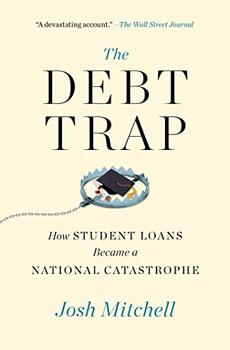Summary | Excerpt | Reviews | Beyond the Book | Readalikes | Genres & Themes | Author Bio

How Student Loans Became a National Catastrophe
by Josh Mitchell
Balances have grown faster than Americans' incomes. For many borrowers, the well-paying jobs promised by universities never materialized, leading to a wave of defaults on par with those of the 2000s housing crisis. Eight million borrowers are in default on a student loan as of this book's writing. That's not far from the number of people who lost their homes after the housing crash. In recent years, despite a strong pre-pandemic economy, 3,000 people a day defaulted on a student loan.
The program was supposed to reduce inequality, leveling the playing field for society's most disadvantaged. Instead it has increased inequality, harming many of the borrowers it was intended to help. Minority students struggle the most with student debt. Black households with student debt typically owe far more than households of any other race. Black borrowers are three times as likely as white students to default. Nearly 4 in 10 Black borrowers who started college in the early 2000s defaulted.
Student debt has shaped how Americans live, work, and form relationships, research shows. The homeownership rate among young Americans fell to the lowest level in decades just as America's student debt tab soared in the 2000s and 2010s. Student debt was one big reason why. Couples are delaying marriage because of their high student loan bills. They are holding off on starting businesses. They are delaying saving for retirement. They are choosing jobs solely for higher salaries, rather than jobs that best suit their talents and interests, so they can pay off their debt.
A college degree once led to higher wealth. Debt has eroded that advantage. Among Americans born in the 1980s—the millennial generation—college graduates are only modestly wealthier than those who never went to college. While they earn far more than nongraduates, they have failed to build the savings that prior generations of graduates did, in no small part because their debt has consumed so much of their earnings.
It's not just the young. Student debt has become multigenerational. Just over half of all borrowers are over 35; a fifth are over 50. Many older Americans are still paying their own debts; others borrowed to pay tuition for their offspring. The debt is depriving them of a financially secure retirement. Over the past decade, hundreds of thousands of senior citizens have had their Social Security checks reduced as the government collects on unpaid student debt. Many seniors have no other income. The reduced checks have left many living below the poverty level.
Meanwhile, the program has become a drain on the federal budget. When borrowers fail to repay, taxpayers cover the tab. The cost of covering defaults is absorbed in the budget. The losses are growing so large they are bound to drive up the federal deficit in coming years. Of the $1.6 trillion in student debt, borrowers are on track to pay back only two-thirds, leaving taxpayers on the hook for more than $500 billion. That's almost the amount of subprime mortgage debt that private lenders wrote off after the housing crash. It's seven times what the government spends on food stamps each year.
How could this happen? The Debt Trap attempts to answer Lisa's question. This book is the culmination of eight years of reporting, including hundreds of interviews with borrowers, college presidents, members of Congress, congressional aides, presidential advisers, lobbyists, and Wall Street investors. The reporting includes interviews with the first four CEOs of Sallie Mae, the company that, with a mandate from Congress, created the student loan industry.
Student debt was supposed to be an equal partnership among those parties and America's families. Banks and schools would lend, with a little help from the government; students would borrow, work hard in school, and pay back their loans with interest as they got the job of their dreams and lived happily ever after.
Excerpted from The Debt Trap by Josh Mitchell. Copyright © 2021 by Josh Mitchell. Excerpted by permission of Simon & Schuster. All rights reserved. No part of this excerpt may be reproduced or reprinted without permission in writing from the publisher.
Your guide toexceptional books
BookBrowse seeks out and recommends the best in contemporary fiction and nonfiction—books that not only engage and entertain but also deepen our understanding of ourselves and the world around us.